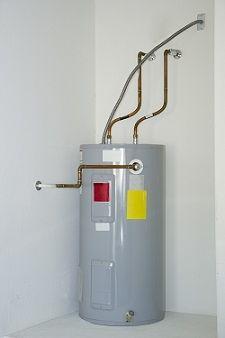- Vancouver 360-369-3586
- Portland 503-925-3504
- Fast No Obligation Estimate
- Home
- About
- Plumbing Services
- Emergency Plumbing
- Drain Cleaning
- Leak Detection & Repair
- Sewer Line Repair
- Repiping
- Trenchless Pipe Repair & Replacement
- Water Heater Repair
- Water Heater Installation
- Main Water Line Repair
- Main Water Line Replacement
- Garbage Disposal Repair & Installation
- Faucet & Fixture Installation
- Toilet Installation
- Trenchless Boring Services
- New Construction
- Commercial Plumbing
- Water Filtration and Softening
- Water Damage Restoration
- Electrical
- Heating & Cooling
- Restoration
- Service Area
- Reviews
- Coupons
- Contact Us
- Membership

5 Signs That It’s Time to Replace a Water Heater
by Sarkinen Plumbing | Aug 28, 2018
Here Are 5 Signs It’s Time For A New Water Heater

Sooner or later, you are liable to see indications that the water heater must be replaced. Whether it is due to the age of the tank or usage strain, water heaters have a lifespan of around 10 years. While you may help extend the life of the water heater with yearly maintenance, odds are you will have to have your pre-existing tank replaced with a new unit if you occupy any given home for over 8 years. Thereby, it is vital that you know as a homeowner about the indications which would be a sign that it is time to replace the water heater or consider water heater repair.
The Water Heater Is Too Old
Nothing will last forever, least of all the water heater. Within the course of any average home occupancy, an occupant is bound to be faced with that moment in which they have to replace the water heater. The thing is, the majority of homeowners aren’t aware of when the water heater gets to its expiration date. However, not knowing this may lead to huge risks as the heater begins to act up because of old age.
Age Limitation
Most water heaters last from 8 to 10 years. While 10 is the age at which replacement generally is suggested, the actual necessity to replace the heater might arise after or before this timeline. Whether or not the heater starts to show symptoms, you ought to replace it as 10 years have passed from its date of manufacture.
Heater Inlet/Valve or Rusty Water
Although steel is the strongest product on the face of the earth, it does have its weakness: rust. As corrosion takes hold upon a steel surface, it gradually spreads and eats through steel in specific areas. On tanks and water pipes designed of steel, rust will serve as a warning indication for oncoming leaks.
Sounds from the Heater
One other telltale indication of an ailing water heater is sound from the tank. When the heater grows older, rumbling sounds will begin to emanate increasingly louder as the tank heats water. Within households which use massive amounts of warm water, the issue will probably be even more pronounced as the cause takes hold.
Water That Surrounds the Heater
When the water heater gets to the end of its life expectancy, there is an increased opportunity that you will see water appear around the tank on the floor. As you see water, it usually means one thing: a leak. Depending upon where the water heater is located inside your home, a leak might result in substantial damage to your property. The most dangerous issue which could ever happen would be a severe leak with the water heater.
Main Cause of Leaks
Water leaks often are the result of metal expansions in the tank. The expansions happen over a period of time as the tank’s inner body gets exposed to thousands of heating cycles. When the fracture initially forms, the gap is probably small enough to hold water in all but the most trying situations. Thereby, as the tank is idle, water will not leak, yet as the metal expands at the height of every heating cycle, small bits of water are bound to leak via the gap.
Alternate Causes of Leaks
Water leaks are not always the result of metal expansions. In some instances, in which leaks have happened, there may not even be an issue with the tank itself. If water appeared around the tank, look at the following water heater components for indications of moisture:
- The temperature/pressure overflow pipe
- Fittings/connections to the tank
If there is evidence of leaking in either of these spaces, there might be something wrong with the fittings; then you will have to have a plumber come out and assess the problem. If the fittings and connections show no signs of leaks, the tank itself is more than likely at fault. It’s possible to correct the former issue with adjustments and tightening, whereby tank leaks actually have no remedy. Thereby, if water is directly leaking from the tank, it is time to replace the water heater.
Risks
A leak inside the water heater might be one of the most severe home maintenance problems that you are bound to face all throughout the period of occupancy at any given residence. If your heater is situated inside your home on the ground floor, a leak might unleash these consequences:
- Mold that stems from the absorption of rotted water into walls, floors, and carpets
- Destroyed/saturated possessions— records, books, furniture, electronics, antiques, etc.
- Ruined/soaked carpet
So, you will want to have a leaking water heater immediately replaced if it’s located at ground level in your home. A small leak may not be as immediate if the heater is situated in your garage or basement without any valuable possessions placed nearby, yet you still will want to take action sooner rather than later.
Water No Longer Heats to Suitable Levels
Hot and warm water are among the most critical household necessities. Without hot water, you cannot take showers or wash your hands, nor are you able to clean dishes or operate your washing machine. The majority of residents take hot water for granted, and therefore are set off balance as water from the bathtub or sink doesn’t reach enough warmth.
The loss of heat in the water supply is probably down to 1 of 3 potential problems with the water heater:
- Tank that is too small for the size of your home
- Broken heating element
- Misadjusted thermostat
Thermostat Adjustment

If the water from the faucets does not reach suitable heat levels, the issue could be down to a problem with the electrical thermostat. For issues like this, the solution would depend upon a simplistic thermostat adjustment. To bring enough heat to a household water system, the thermostat’s settings should be from 120℉ to 140℉.
Broken Heating Element
If nothing but cool water pours from the bathtub and sink faucets, the problem might stem from a broken heating element inside the water heater. With an easy call to the plumber in your area, you may probably receive the repairs you will need and get the heating functions restored in a matter of hours. If your water heater has been made within the last 8 years, a sudden heating power loss is probably not cause for a heater replacement.
Recent Posts
- Vancouver 360-369-3586
- Portland 503-925-3504
- 9502 NE 72nd Ave Vancouver, WA 98665
It’s as easy as 1, 2, 3!
- Complete the form below so we can schedule your service appointment.
- You will receive an email confirming your appointment details.
- We will text you 30 minutes prior to the technician’s arrival.
Recognition & Awards
customer reviews
![]()
“Highly satisfied with all the work done! Pleasant, friendly worker’s—all work completed lightning-quick and stayed on site until all issues were fully taken care of! Hardly knew anyone was here after work was finished! Can’t go wrong with these people!! Will use again when needed!”
Leonard K.
Vancouver Location
Proudly Serving
Portland and Vancouver
from Wilsonville to Longivew &
Hillsboro to Gresham
UBI # 602-521-027
OR Contractor Lic# 170052 (CCB)
WA Contractor Lic# SARKIPI946MF
OR Plumber Lic# PB115
Customer Satisfaction
4.6 stars - Based on 227 Reviews
![]()
Vote Here For Sarkinen Plumbing in the 2020 Best Of Clark County!
Plumbing Services
- Emergency Plumbing
- Drain Cleaning
- Leak Detection & Repair
- Sewer Line Repair
- Repiping
- Trenchless Pipe Repair
- Water Heater Repair
- Water Heater Installation
- Main Water Line Repair
- Main Water Line Replacement
- Garbage Disposal Repair & Installation
- Faucet & Fixture Installation
- Toilet Installation
- Trenchless Boring
- New Construction Plumbing
- Commercial Plumbing
- Water Damage Restoration
SW Washington Service Areas
Oregon Service Areas
Contact Information
Sarkinen PlumbingVancouver
9502 NE 72nd Ave
Vancouver, WA 98665
Phone: 360-369-3586
Portland
Phone: 503-925-3504
Hours of Operation
Monday - Sunday 24-hours







